- Home
- Jane Arbor
Return to Silbersee
Return to Silbersee Read online
Return to Silbersee
Jane Arbor
Karl was a challenge she couldn't ignore!
Reluctantly, Juliet prepared to leave Silbersee, and the Bavarian wood-carving school that had been her second home. Then Karl Adler came storming into the place and Juliet changed her mind.
In Karl's eyes, Juliet had letdown his stepbrother when he most needed her--for what Karl insisted were her own selfish reasons. To Juliet, Karl was the business tycoon planning to destroy her picturesque lake by building a sawmill.
It was foolish to think their differences could be resolved!
All the characters in this book have no existence outside the imagination of the Author, and have no relation whatsoever to anyone bearing the same name or names. They are not even distantly inspired by any individual known or unknown to the Author, and all the incidents are pure invention. The text of this publication or any part thereof may not be reproduced or transmitted in any form or by any means, electronic or mechanical, including photocopying, recording, storage in an information retrieval system, or otherwise, without the written permission of the publisher.
This book is sold subject to the condition that it shall not, by way of trade or otherwise, be lent, resold, hired out or otherwise circulated without the prior consent of the publisher in any form of binding or cover other than that in which it is published and without a similar condition including this condition being imposed on the subsequent purchaser.
First published 1978
Australian copyright 1978
Philippine copyright 1978
This edition 1978
© Jane Arbor 1978
ISBN 0 263 72833 1
Set in Linotype Plantin 11 on n pt
Made and printed in Great Britain by Richard Clay (The Chaucer Press), Ltd., Bungay, Suffolk
Chapter One
On either side of the downward road from the snowline the scene contradicted itself.
Under the thick canopy of the forest trees the soil was dark, dry and loamy; where the country opened out the hedges were massed white with blackthorn blossom, though snow still lay in the field furrows and on the roofs of lonely farmsteads; there was real warmth in the sunshine, but the wind had a knife-edge. As usual, the hand of Bavaria's winter was still holding fast to the reluctant fingers of its spring.
Juliet drove slowly, watching for a sheltered spot where she could pull in and park and eat her packed lunch with the car door open to the sun-. At last she found one—a small roadside clearing which led back to a forest ride. She passed it at first, then backed on to it and got out to see if perhaps she could picnic outside.
There was no view, except across the road to fields already under the plough, but the wind was only a. howling behind the trees and the calm air was almost balmy. She threw back the hood of her anorak and was standing with her face lifted to the sun when another car passed on the road, slowed a hundred or so metres ahead, then backed down as she had done in her own car.
She frowned, annoyed at the prospect of sharing her little well-found spot with anyone. This was a by-road; her triangle of springy turf wasn't marked by authority as a layby for tourists; there were plenty of finer beauty spots higher up the Pass and lower down, near the Lake, and there really was no reason why!
She stood her ground as the driver drew level with her and stopped. Perhaps, she hoped, he only wanted to ask his way. But apparently not, for he was getting out, slamming his door and peeling off his gauntlets as if he had arrived to a welcome at his journey's end.
Which was absurd. Since this out-of-the-way neck of the woods couldn't possibly be anywhere where he meant to finish up, Juliet made her look at him cool and uninviting.
He was blond, tall, a virile giant of a man, an easy- muscled golden-skinned type with, she had to allow, at least a vestige of good manners in his slight bow as he asked,
'Stretching your legs after a long drive, Fraulein? D'you mind if I do the same?'
She questioned, 'Here? Of course not. But you could have found some places with better views further back, I'd have thought.'
He stood, legs apart, hands on the hips of his leather jerkin, and lifted one shoulder in a shrug.
'Perhaps,' he agreed. 'But after I had passed, I thought I rather liked what I had seen here, so I came back.'
Though the words were innocuous, there was no mistaking the practised flattery of the look, which accompanied them, and which Juliet deliberately ignored by continuing, 'There's some fine scenery too as one drops down to the Silbersee. But perhaps that isn't your road?'
'Is it yours?'
'Yes—eventually.' (If he expected they would make a caravanserai of two cars when they moved on, then he had better think again!)
He said, 'Ah well, I'm on my way to Munich— eventually. Or rather, returning there from across the Austrian border.'
'But this isn't the main road for Munich,' Juliet pointed out.
'No, but I made a detour up to Innsgort to judge the last of the skiing prospects. You've been up there yourself?'
She nodded. 'I had one day. I stayed overnight.'
His glance went to her car, apparently noting that - no skis were strapped to it nor thrusting from its boot. 'No gear?'
'I don't bring it down. I left it up there,' she said shortly, feeling no need to enlarge on why it wasn't with her this time.
'And now?'
'I stopped here to picnic before going on.'
'Alone?'
'I like picnicking alone.'
He laughed. 'The snub direct! Or may I hope you are merely being tactful about telling me that you haven't brought enough Knackwurst or Pretzels to share?' When she did not reply and turned back to her car, he went on,
'Very well. Snub taken, and though it's a free country and I could sit in the offing until you took pity on me and threw me a crust, I won't embarrass you so far. Enjoy your lone sausage, Fraulein!' But as he got into his own car he looked over his shoulder. 'But you are not a Fraulein, are you? For all your good German, you are not one of us?'
'No. I'm English.'
He took his seat and handled the steering-wheel. 'Ah, that bears it out,' he murmured.
'Bears out what?' she questioned, seeking an opening for a retort which would wither him.
'The popular theory we have that all the English are born with only half a heart,' he claimed coolly, and to judge by his carelessly sketched salute, he was singularly unwithered as he drove away.
Cheated of her retort but glad he seemed to have realised that she wasn't fair game for an arrogant takeover, Juliet unwrapped the napkin around her food, which wasn't sausage, but blue cheese and rye bread, a slice of rich Torte and an outsize orange, put up for her by the Innsgort hotel. She thought about the stranger.
Not easy to place. Big, powerful car. Informal but good clothes, carelessly worn. Cultured voice. An assurance amounting almost to conceit. Businessman? Professional? Playboy? Anyway, as much of an opportunist as the next man, if he could claim to have been attracted by the sight of her very ordinary figure, anoraked and sturdily booted against the cold, long dark hair lifted and tangled by the wind, normally fair skin stung to a glow and, in all probability, the tip of her undistinguished nose unbecomingly red.
And yet, for all his easy assumption that lone-girl- in-car-making-unforced-stop-by-wayside added up to invitation-to-any-male-happening-along, somehow she was left with the impression that if they had met in the way of business or socially, she wouldn't have dismissed him as a mere Lochinvar with ideas above his station. She might even have found him attractive...
Deliberately she broke off her thought there and spread butter on her Roggenbrot with a generous hand.
He was on his way to Munich now, his ab
ortive attempt to pick her up half forgotten and behind him, while she had other problems ever present and ahead of her, in which the silly encounter had no place.
She thought about yesterday—her last of skiing on the Innsgort slopes. Not because the season was over —Innsgort kept good snow conditions through the blackthorn winter of late April and sometimes into May—but because, between now and when she left Rutgen-ober-Silbersee, she would not be going to Innsgort again. That was why she had sold her skiing gear before coming down this time.
She was going to hate leaving the Silbersee, the silver lake that was more often green and blue and, under storm, a drab grey, and only a true gleaming silver by moonlight. Which was how she had first seen it herself, arriving by taxi from Gutbach, the nearest railway station—how long ago now? A few months short of three years, in a wild autumn with the threat of a cruel winter, the fullness of which, that time, she had not stayed long enough to experience.
And now, sitting here in a forest clearing, she was conning over the harsh economics which were forcing her back to England a second time. Not, actually, her own problem, those economics, but with enough chain reaction to change a pattern of work and living which, since her return to the Lake, she had enjoyed.
She prolonged her picnic for more than an hour, scattering the crumbs of her meal for the birds before she left to drive the rest of her way home.
In late April the sun went behind the Volksspitze, the highest peak of the Frohnbergs, by mid-afternoon, and she was going to be glad to gain the warmth of the Wood-carving School chalet—the long, one- storeyed building facing the lake, at one end of which she had her quarters.
That first time she had written back to England that Rutgen was 'oh, so quaint and terribly Brothers Grimm', but the longer she had seen and lived in it since, the more she was captivated by the charm of its hamlet-scatter of small houses, almost all with their fa9ades to the lake, except those which looked at each other across the tiny village square; its dark backcloth of immemorial forest trees; the slender-spired church with its tinny-sounding Glockenspiel and its high- perched Schloss, turreted and grey and brooding by day, but in its present guise as an hotel, fairyland arc- lighted by night.
The school building was wholly of wood, with an openwork carved balcony running its full length, and its tide-legend Die Schule des Schnitzarbeits in a crescent of carved old German lettering above its central entrance door.
Juliet's own quarters—a living-room, a bedroom, kitchen and bathroom—had the same rich smell of cedar as had the school workshops. And it had a tiny terraced garden, from which a short flight of wooden steps led down to the lake-edge. She had promised herself a lot of pottering in that garden—come the summer she wouldn't now see.
This was the end of the winter work season, and there would have been no one in the shops except perhaps old Wilhelm Konstat, her right-hand man, that day. After opening up the living-room stove to a glow, she had switched on the ketde and was splitting some muffins for toasting for her tea, when the telephone rang. The automatic kettle switched itself off as she lifted the receiver to a call from the Baronin, the widowed owner of the Schloss von Boden, the castle home of generations of von Bodens until the new-poor Baroness Magda von Boden had opened and run it herself as a high-class guesthouse some ten years earlier. She was still, as always, 'lady of the manor' to the tenants of her late husband's vast wooded estate, and Juliet felt privileged to know herself to be one of the few people, apart from her men of business, to whom the Baronin had confided the financial difficulties forced upon her by her own increasing age and the headlong race of costs which couldn't be halted. In her seventieth year the gallant Baroness was a tired woman and one whose future, but for the drastic moves to which circumstances had driven her, looked bleak indeed.
'Julie?' The Baronin always used the German form of Juliet's name. 'Oh, you are there? I thought you mightn't yet be back from Innsgort. I rang because— look, dear, I haven't much time, for he is on his way now. Left the Schloss a few minutes ago. Looking round some of the tenancies, including the School. He isn't with you already, by the way?'
Knowing coherence to be no strong point of her friend's when she was in a hurry or agitated, Juliet said patiently, 'No, no one has called here since I got in. But who is "he"?'
There was so long a pause that the Baronin might not have heard the question. At last she said, 'This you won't understand and probably won't like. But it's Herr Adler—Karl Adler, the Chairman and Chief Director of Adler Classics. Gerhard's half-brother, whom Gerhard never let either of us meet, though when Gerhard died and I was abroad for a month at the time, I understand he came to the funeral. And now he—that is, the Adler Group are doing this deal for my standing timber, and he wanted, he said, to make a personal and informal survey of the estate. He arrived, right out of the blue, just this afternoon.'
On a long breath of surprise, Juliet said, 'You're right. I don't understand, and it is a bit of a shock. But why Karl Adler? What has his firm to do with your sale? Your solicitors have been negotiating with Hartung Gesellschaft of Hanover, haven't they?'
'Yes. But Hartung have fallen to a lightning takeover by Adler. I've known of it for a week. But I saw the whole thing being done at boardroom level—signatures on the dotted line, and all that. I didn't suppose there would be any personal contacts necessary. Even with me, and still less with you. You understand, Julie? I told him about you, of course '
'All about me?' questioned Juliet heavily. 'Oh no. Only how you came originally to take a course under Gerhard, and went back to teaching handicrafts in an English school. And how, when he died fifteen months or so later, I persuaded you to come back and run the management side of the School. Nothing at all about Gerhard and you, Julie. I assure you, nothing.''
'Well, thank you,' Juliet said. 'At least I'm prepared, if Gerhard has to be mentioned. But there's something I don't understand. You are selling a lot of your standing timber. Right? But since neither Hartung nor Adler are buying the estate, what interest can Herr Adler have in your tenants' holdings?'
'Yes, well, that's ' But at an interjection from
Juliet the Baronin paused. 'What is it, dear? Has he arrived?'
'I think so. I heard a car.'
'Well, ring me, won't you, when he has gone?'
'Yes.' Juliet replaced the receiver and went to the door which gave straight into the living-room. Against the deepening twilight the man on the threshold was at first only in silhouette. Then he offered his hand. 'Fraulein Harmon? I am Karl Adler. May I come in?' he said. And came in.
Her recognition of him was of course instant though incredulous. That man, her noontime brash gallant, had been on his way to Munich and had had time to waste. He wasn't a self-made tycoon, reputed to have made a million from mass-produced furniture design before reaching his mid-thirties; the half-brother of dead Gerhard Minden, both of them handling the same raw material—wood, but one of them a big-business Colossus and the other an individual, dedicated craftsman.
Or was he? If he were Karl Adler, and he said he was, then he had to be also her stranger of the morning. For he was the same virile hunk of man, bearing the same assuredness of a welcome until...
Why had his obvious recognition of her suddenly turned to a cold stare, disconcerting in its intensity and utterly chilling in its appraisal? This morning he had wanted to know her, however flirtatiously; tonight his look seemed to convey that there was nothing he wanted less. She also had the impression that his polite 'May v I come in?' before he recognised her had been more of an order than a request. He had meant to come into Juliet Harmon's house, invited or not, and he intended censure and blame of her when he arrived. What could he know?
As calmly as she could she moved back from him and went to sit by the stove, pointing him to another chair, which he took.
She said levelly, 'We met this morning by coincidence, didn't we, Herr Adler? Without either of us knowing who the other was?'
He nodded. 'Though
you must know I've heard of you before—in none too favourable terms?'
'Really?' Though his look had conveyed it, Juliet had to conceal her shock. Had the Baronin lied then that she hadn't gossiped to him? Surely not? But if not Magda von Boden, then who? She took refuge in counter-attack.
'And you must know that I've heard about you— from Gerhard, your half-brother, whom you refused to see or help, even when his doctors had given him an indefinitely short time to live!'
'I didn't refuse to see him. Our estrangement was mutual and of years' long standing—ever since, in fact, my mother separated from Gerhard's father and took me with her, the four of us never meeting again, as you probably know.'
Juliet said, 'I do know. Also that it was by no fault of mine that you didn't see Gerhard before he died. I wrote you a letter '
'I never received one.'
'No. When I told Gerhard what I had done, he made me destroy it. But then, without his knowing, I came to your offices in Munich; sent in my name to you, only to be told that you saw no one without their stating their business.'
'Reasonable, surely? I'm a busy man, and at that date I had never heard of you.'
'No, though I'd have thought you could bend a rule, considering I had said my business was personal.'
'My dear girl!' Karl Adler laughed shortly. 'You evidendy don't realise the extent to which cranks and spongers regard "personal" as a kind of talisman for gaining sympathy for their woes. You could have mentioned Gerhard's name and sent my secretary to me again.'

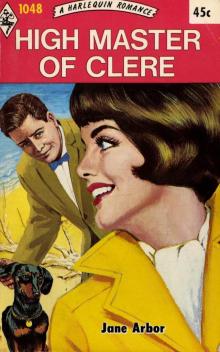 High Master of Clere
High Master of Clere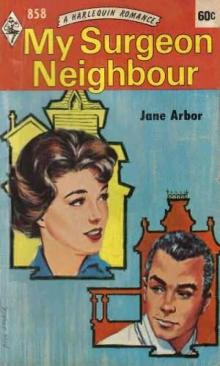 My Surgeon Neighbour
My Surgeon Neighbour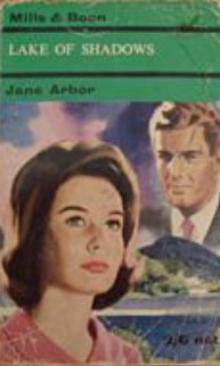 Lake of Shadows
Lake of Shadows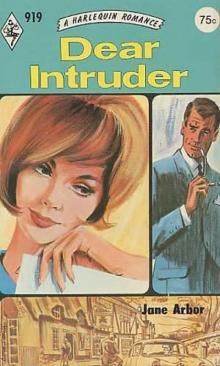 Dear Intruder
Dear Intruder Flash of Emerald
Flash of Emerald Return to Silbersee
Return to Silbersee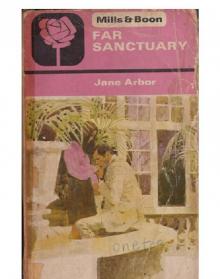 Far Sanctuary
Far Sanctuary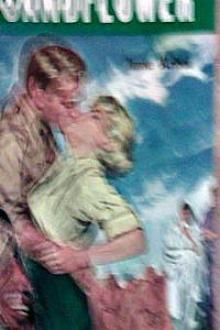 Sandflower
Sandflower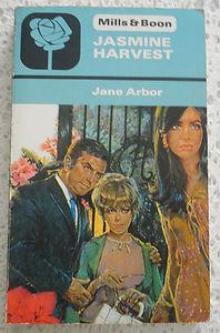 Jasmine Harvest
Jasmine Harvest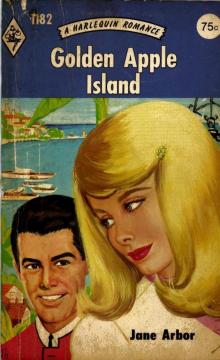 Golden Apple Island
Golden Apple Island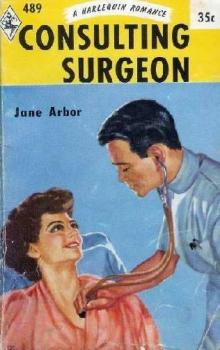 Consulting Surgeon
Consulting Surgeon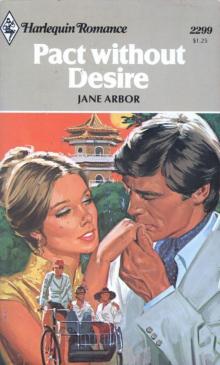 Pact without desire
Pact without desire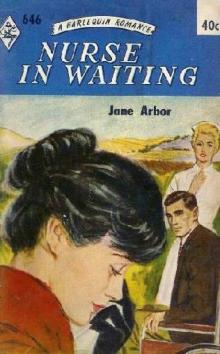 Nurse in Waiting
Nurse in Waiting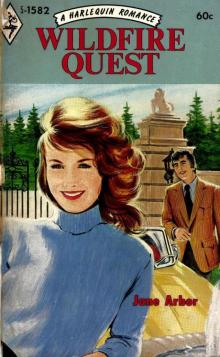 Wildfire Quest
Wildfire Quest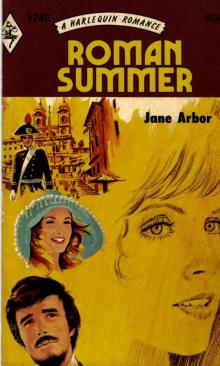 Roman Summer
Roman Summer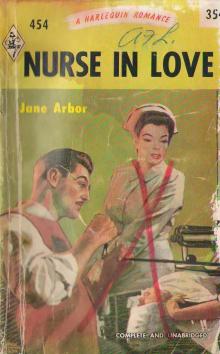 Nurse in Love
Nurse in Love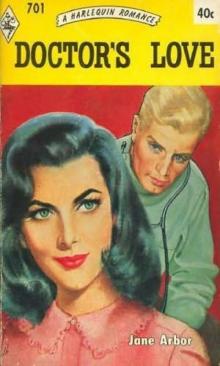 Doctor's Love
Doctor's Love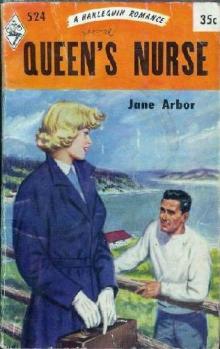 Queen's Nurse
Queen's Nurse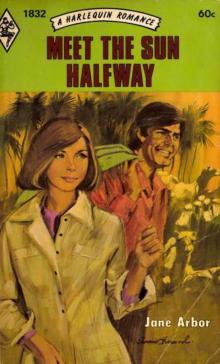 Meet the Sun Halfway
Meet the Sun Halfway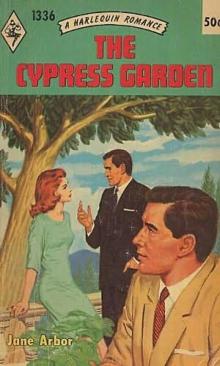 The Cypress Garden
The Cypress Garden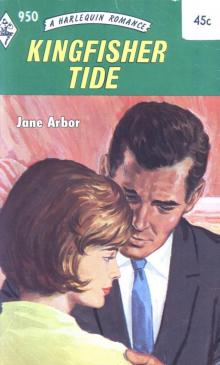 Kingfisher Tide
Kingfisher Tide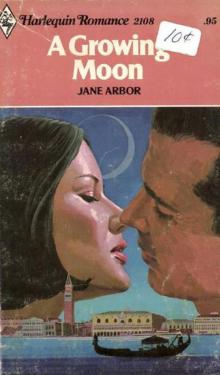 A Growing Moon
A Growing Moon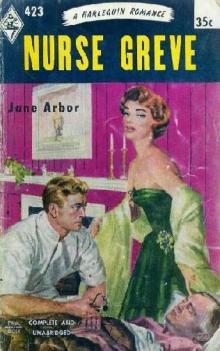 Nurse Greve
Nurse Greve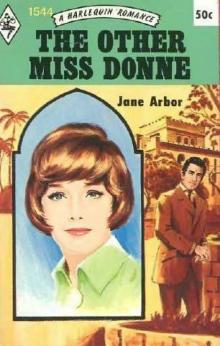 The Other Miss Donne
The Other Miss Donne